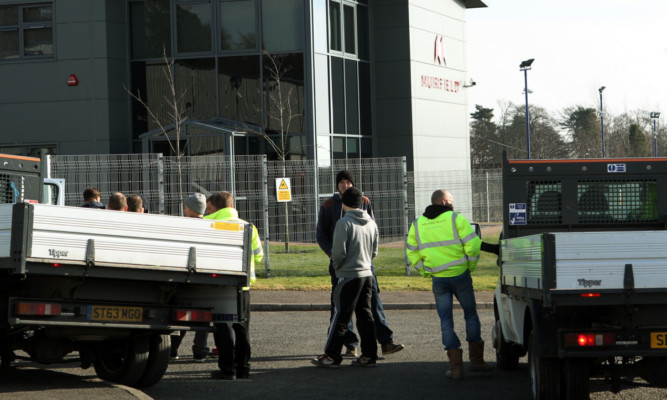The number of Scottish businesses going to the wall fell by more than a fifth in the first quarter of the year.
New figures from accountants KPMG show there were 188 corporate insolvencies in the first three months of the year, down from 239 a year earlier.
The period included high-profile failures such as Dundee’s Muirfield Contracts, which sent shockwaves through the local business community when it called in administrators last month.
The sudden collapse of the business, which in 2013 boasted a seven-figure profit from turnover in excess of £40 million, after 27 years of trading left more than 360 staff and outside contractors out of work.
The KMPG figures show there were a total of 20 administrator and receivership appointments across Scotland in the quarter, one more than reported during the equivalent period last year.
However, the number of liquidation appointments, which tend to relate to smaller businesses, fell by 24% from 220 to 168.
On a consecutive quarterly basis, administration appointments were up two while instances of liquidation fell by 24.
Blair Nimmo, head of restructuring for KPMG in Scotland, said the general trend was improving but business still faced significant uncertainty.
“It’s clear as we enter the second quarter of 2015, in general, businesses are in a stronger position,” Mr Nimmo said.
“Buoyed by an overarching recovery, economically we’re seeing a positive trading environment for both large and smaller organisations in Scotland, which is reflected by the drop in insolvency appointments.
“That being said, volatility in oil prices as well as uncertainties around the outcome of the general election may have wider repercussions for the economy as businesses adopt a ‘wait and see’ approach to growth.
“Both our restructuring advisory and debt advisory practices remain busy however, dealing with issues which remain critical to many businesses including pension deficits, working capital management, cost reduction and refinancing.”
The new figures came as new research from Strathclyde University suggested small and medium-sized enterprises (SMEs) were failing to tap the full potential of their employees.
The research found SMEs, which account for 98% of ventures in Scotland and 37% of turnover from private enterprise, were losing out by failing to encourage innovation in the workplace.
“SMEs play an important role in the Scottish economy, accounting for 55% of private sector employment, but this significant contribution could be enhanced even further,” Professor Patricia Findlay said.
“Our studies have shown many company owners don’t see innovation as being especially relevant to what they do every day, and some are unaware of the innovative potential present in their businesses.
“Investing in staff capability and supporting staff to find more effective ways of working, and rewarding them for doing so, can be an extremely effective way of addressing business challenges, boosting productivity and profitability and, crucially, improving employee experience and workplace relationships.
“During discussions with business leaders it became clear that the biggest obstacle to this is time. While many businesses are excelling at idea generation, the scarcity of time for implementing new processes and practices means many ideas don’t get beyond the drawing board.”
